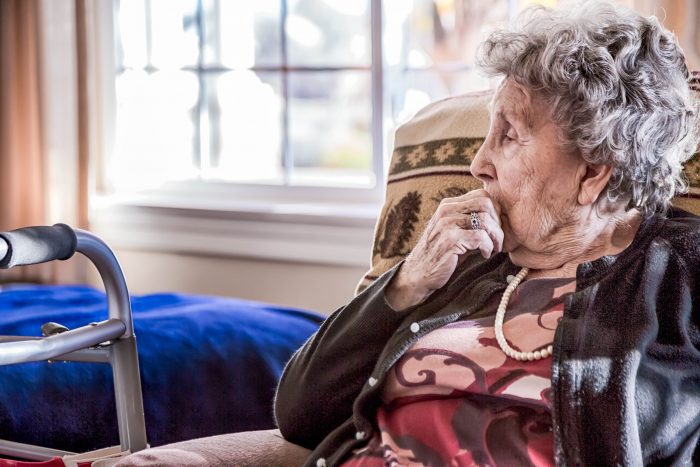Reviewed by Jeffrey Sanzel
Grandparent Scams — often referred to as “Gram Scams” — most commonly take the form of a young man calling with an urgent financial crisis (overdue rent, car repairs, accident, jail bond) and requesting gift cards, a money transfer, or some other mode that does not require identification to collect. Elder fraud has sharply increased, with $3.4 billion in losses in 2023 (up 11% from the year before).
Thelma, the wonderful film written and directed by Josh Margolin, follows 93-year-old Thelma Post (June Squibb) as she embarks on a quest to recover a scammed $10,000. The simple, linear storyline opens with the nonagenarian coached by her loving grandson (Fred Hechinger) on how to scroll through emails. She is simultaneously independent and reliant on the support of her family. When the police cannot help recover her ten grand, she takes matters into her own hands.
A plot of this nature could easily devolve into a series of comic capers, forced hijinks, and geriatric jokes. Instead, Margolin skillfully opts for a quieter, more methodical, and ultimately honest approach. Thelma first attempts to reach out to friends for help and discovers in a montage of phone calls that most are ill or dead. The awareness is one of many beautifully crafted “ah-hah” beats in a film that never skews to the easy choice.
Eventually, she teams up with the initially reluctant Ben (Richard Roundtree), a friend residing comfortably in an assisted living/nursing home. Using Ben’s two-person scooter, their first stop is the home of their friend Mona (Bunny Levine). In one of the most subtlety touching but equally raw scenes, neglect and isolation are brought into clear focus. (Levine is flawless in her few minutes of screen time.)
Running parallel is Danny’s story, with his protective but often disappointed parents, Gail (Parker Posey) and Alan (Clark Gregg). As they hover and worry over Thelma, they also fret about the underachieving Danny, who cannot get his life together. The brittle family dynamic plays an important part of the action and the resolution.
Thelma is peppered with “don’t-I-know-you” encounters that reflect decades of living but also loss. The screenplay is smart, sharp, and wholly sincere without ever being saccharine or sentimental. Lines that would seem predictable or even pablum resonate: “I didn’t expect to get so old” is not a lament but a statement of fact. This approach to reality is a hallmark of the film’s delicate blend of humor and poignancy. And Thelma is truly funny, with many laugh-out-loud flashes but none that ever cross into farce. (The production of Annie, in which Ben stars as Daddy Warbucks, is hilarious but not ridiculous.) The use of cell phones connected to hearing aids seems almost like a bit, but later comes into important play. Nothing in Thelma ever feels less than truthful.
June Squibb’s early career included appearances on Broadway in Gypsy (1959), The Happy Time (1968), and The Public Good (1975). Her first television role was in a 1985 CBS Schoolbreak Special and her film debut was in Woody Allen’s Alice (1990). Her many appearances made her a reliable and recognizable character actor, with a breakthrough in Alexander Payne’s Nebraska, where she played opposite Bruce Dern. She received over two dozen nominations, including one for an Academy Award. With Thelma, she will most likely receive equal accolades and a second nomination if not a win. The 93-year-old Squibb (who cameos as the voice of Nostalgia in Inside Out 2) offers a nuanced, touching, and completely connected performance. She is incapable of anything less than being fully present with each triumph and setback. Squibb’s Thelma is unmatchable and so far one of the year’s strongest performances.
In his final role, Richard Roundtree gives Ben true dimension. Best known as Detective John Shaft from the 1971 film Shaft and its numerous sequels, Roundtree infuses Ben with a mix of insight and melancholy, somehow showing contentment and resignation. He and Squibb seamlessly present the tenuous connection that grows to a newfound affection. In one of the most memorable interactions, a fall leads to a scene of deepest compassion and, even more so, understanding.
As the grandson, Hechinger avoids the usual slacker traps by balancing familial love with barely masked anxiety. Posey and Gregg’s parents come across as slightly goofy, but their palpable concern gives weight to their frustrations. Nicole Byer and Quinn Beswick elevate the minor supporting roles of assisted living staff. Malcolm McDowell offers levels in what could be a one-note performance.
Thelma is not The Golden Girls or the lowest-common-denominator of “Where’s the Beef?” Age is central but not an easy punchline. Thelma is heartfelt and sometimes painful — it confronts hard truths even in its lightest moments. But it is a memorable journey and certainly one worth taking.
Rated PG-13, Thelma is now playing in local theaters.







